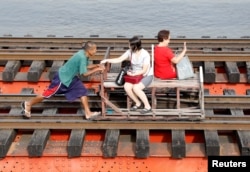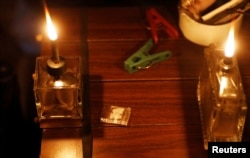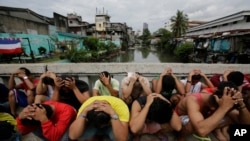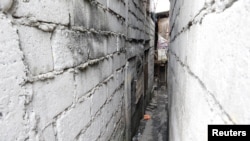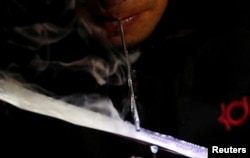Philippine President Rodrigo Duterte’s war on drugs had until three weeks ago driven the trade in crystal methamphetamine underground, according to residents and drug users in some of the slum areas of the nation’s capital city.
As thousands of users and dealers were shot dead by police and vigilantes in the first seven months after Duterte came to power last June, open dealing in the drug, known here by its street name shabu, largely stopped. Instead, deals were done on the quiet between people who knew each other, maybe with a text message first.
But since Duterte ordered the Philippine National Police (PNP) to stand down from the drugs war last month, after declaring the force “rotten to the core,” the drugs trade has come back out of the shadows, more than half a dozen drug users and dealers in some of Manila’s toughest areas said in interviews. Many spoke on condition that only their first names be used in this story.
‘How much are you going to buy?’
Beside one of the less-used railroad tracks in Manila, a grassy area scattered with human excrement only a few miles from the gleaming high-rises of the Makati business district, shabu was easily available last week, costing just a few pesos (cents) per hit.
Residents said that when they traveled on the illegal trolleys that ferry people for a few pesos along the track when there are no trains in sight, a fellow passenger will often offer them a sachet of the drug.
Eusebio, 52, who pushes a wood and bamboo trolley on the track for a living, said dealers sometimes walk alongside calling out: “How much are you going to buy?”
“Now that the operations have been suspended, drugs have become rampant again,” he said. “Those who were hiding have resurfaced.”
Another trolley-pusher, Boyser, 59, told two Reuters journalists: “If you weren’t reporters, they would offer you drugs.”
‘Users are still users’
In a dark cinderblock room that serves as a drug den in another part of Manila, there were similar stories from users.
“We have more freedom now,” Jason, a 39-year-old bartender told a visiting reporter as he inhaled shabu smoke. “All the users are still users, except those who have been killed,” he said, adding that he has used shabu for almost two decades.
More than 8,000 people have been killed since Duterte was sworn in almost eight months ago, about 2,500 of whom were killed in official police anti-narcotics operations. Human rights groups believe many of the others were extra-judicial executions committed as part of the war on drugs, and in cooperation with the police, a claim the Duterte administration has vehemently denied.
The president’s office did not respond to a list of emailed questions about the drug war and whether dealers were now openly back on the streets.
Duterte has repeatedly said he will hunt down drug lords and other “high value” targets and there have been a handful of large-scale seizures and raids on shabu laboratories.
But most of those killed in the war on drugs have been small-time dealers and users in some of the country’s poorest neighborhoods.
The PNP stopped publishing an official tally of drug war killings from police operations on January 31 when Duterte ordered the Philippine Drug Enforcement Agency (PDEA) to take over the campaign.
Fewer killings
According to reporters and photographers from Reuters and Philippine news organizations working the night shift, “vigilante-style” killings of drug suspects have continued, but at a much slower pace. Police data shows 398 people were killed nationwide in the first 20 days of February.
Details of the killings were not provided and it was unclear how many were drug-related.
Some anti-narcotics experts say they would not be surprised if it turns out that the drug war has been ineffective. They say that ruthless operations against drugs, like Duterte’s, have failed elsewhere in the world.
When an aggressive anti-drugs campaign begins, supplies may be tight for a while, street prices may spike, but ultimately drug usage does not drop, say those who have studied the results.
“We don’t know of any examples from around the world where very hard-line approaches have worked effectively,” said Jeremy Douglas, the regional representative for the United Nations Office on Drugs and Crime. “They can temporarily disrupt street business, but they don’t disrupt demand.”
Lost momentum
Some police officers told Reuters that they had received reports of increased street-level drug activity since they were ordered to stand down.
Manila Police Commander Olivia Sagaysay, who oversees four precincts in the city, said the war on drugs had lost momentum and morale among her officers had suffered since they were ordered to stand down.
“It’s depressing,” she said. “But who are we not to follow the higher-ups?”
She said she expected the trade to increase but maybe not return to its previous levels because “networks were disrupted” and “pushers were killed.”
In a written response to questions from Reuters about the impact of Duterte’s campaign on the street-level shabu trade, the PDEA said that “based on reports gathered, the supply of illegal drugs in some areas are still considerably abundant.”
The PDEA attributed low street prices for shabu — prices overall have risen only minimally since the war on drugs began and in some areas have fallen — to a “lack of customers” or drug traffickers trying to get rid of their supply “in order to avoid arrest.” It said drugs were being hoarded and that it was difficult for users to transact directly with traffickers. The PDEA did not provide evidence for any of its assessments.
PNP spokesman Dionardo Carlos said drugs would return to the streets because it was “a billion peso business” and “money talks.”
In his view, though, the drug war had not failed.
“We hit the target and now it goes back to PDEA. As far as the PNP is concerned we did our part in the past seven months. I hope PDEA will be able to do their part,” he said.
The PDEA has just about 1,800 people compared with the national police force of 160,000. Of the existing PDEA personnel, only about half are field operatives.
PDEA spokesman Derrick Carreon said his agency will add staff and that the president would soon be issuing an executive order to set up an anti-illegal drugs inter-agency council and task force that would also draw from the military, the National Bureau of Investigation and the PNP. The task force will be charged with pursuing the war on drugs.
“There is a temporary vacuum of warm bodies but it won’t be long,” Carreon said, adding that those involved in the drug trade would be wrong to think they were safe.
“If that’s their perception, it won’t last long,” he said. “They will find out in the hardest way that they are terribly wrong.”
‘Go after cookers’
Still, Jason, the bartender who is a shabu user, said Duterte’s campaign was not successful because he targeted the wrong people.
If authorities had gone after the “cookers,” the people manufacturing the drugs, instead of users and small dealers, people like him would be unable to buy and would move on. As it is, Jason said, shabu is always in plentiful supply, adding he was addicted and the drug eliminated any fear he may have had of being shot by police or vigilantes.
As he spoke, Jason poured white crystals into a long strip of aluminum foil folded into a trough, tilted it slightly and held a flame below. Almost immediately, it produced a thick white smoke, which he sucked up through a narrow aluminum foil straw.
He then began speaking again, more animatedly. “I buy drugs every day!” he said.





